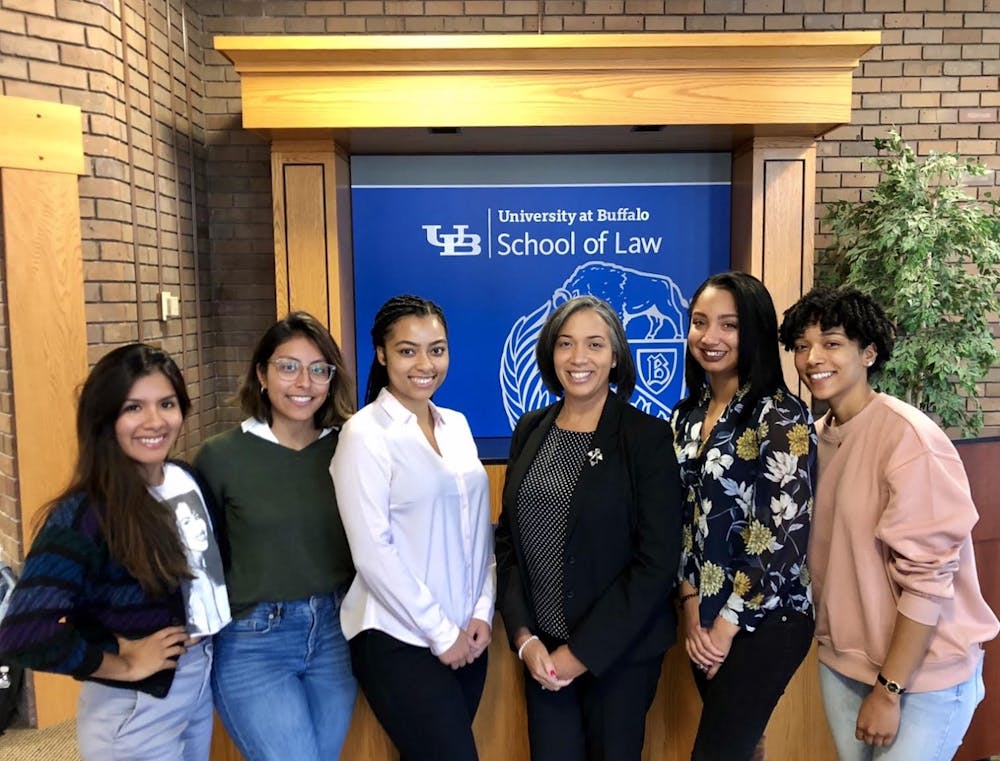During her freshman year of college, Lourdes M. Ventura received a knock on her door from her neighbors.
The neighbors were involved in a criminal case, but were unable to speak with their attorney since they only spoke Spanish. They asked Ventura for interpretation assistance.
Ventura accepted the role, and while working with that attorney, she first heard the words that would follow her throughout her undergraduate career: “You should consider law school.”
Ventura, who double majored in Spanish and social sciences, initially wanted to be a social worker. But that foray into law changed her life.
Now, she’s a New York State Supreme Court justice in the 11th district in New York, Queens County.
Her former Educational Opportunity Program (EOP) mentor, Cheryl Maribel, pushed Ventura to focus on school and keep an eye out for any and every available opportunity to advance her personal and professional development.
“It [college] was a whole new world, and I was not doing too great,” she said. “But she sat me down and said, ‘This is not why you came here.’ Thanks to her, I started doing well.”
Throughout undergrad, Ventura worked at the UB School of Law through a work study program. She gained more knowledge about the field while working closely with professors.
After being nominated for the Arthur A. Schomburg Fellowship Program and gaining full funding for graduate school, Ventura decided to pursue a joint masters in social work and Juris Doctor degree at UB.
“I was going to go to law school for free,” Ventura said. “I thought I could be a social worker with better advocacy skills because I went to law school. So I said, ‘Let’s do it.’”
Ventura said that sometime during her second year of getting her masters, she decided that law was the right choice and that she could “do more by advocating as a lawyer” than she could as a social worker.
After graduating and attaining her Juris Doctorate, Ventura went on to work in both private and government sectors for over two decades.
From serving as an Assistant District Attorney in Queens County to a partner at law firm Ahmuty, Demers and McManus, she gained a number of experiences that helped her attain the position she currently holds.
Ventura also found herself breaking barriers throughout her career, becoming the first Latina to serve as president of the Queens County Women’s Bar Association and the first Latina to serve as an official of the State Women’s Lawyers Association of New York.
She would become recognized for her contributions to her community and her work as a civil rights attorney. Eventually, colleagues started telling Ventura that she would make a good judge.
“That’s not something I dreamt of, or considered, until someone said it to me,” Ventura said.
During years she was not considered for nomination as a judge of the city civil court, she turned to another mentor, Jose Peralta, the first Dominican-American state senator in New York, who offered her reassurance and helped her strategize how to win.
Peralta was able to witness Ventura finally receive her nomination before he passed away two weeks after. Ventura remains forever grateful for his “encouragement and support” throughout her path.
Ventura gained enough signatures and support to be nominated as a judge of the New York City Civil Court.
Within eight months, the Democratic party told Ventura they wanted to nominate her for the New York State Supreme Court.
“That was unheard of,” she said. “That does not happen. But to be a judge you only have to practice for 10 years. I’ve been practicing for 20 years, and I have been involved in many extracurricular activities. So a lot of people knew me, thank God. They knew my reputation and my work, and that’s what counts.”
Ventura took office as a justice of the New York State Supreme Court’s 11th Judicial District on Jan. 1, 2020.
Ventura believes that her own life experiences provide her with a good foundation. From understanding cultural nuances to her legal knowledge, Ventura brings a different perspective to her current role.
She says she still receives reactions from people who are excited when they walk into the courtroom and see a woman of color behind the stand.
“Even though you think Queens is diverse, there are still not a lot of us [in the courtroom],” she said. “I feel a duty to make sure I am not the last. I want to instill the love I have for law and for life into people that come after me to continue the legacy of helping people.”
To that end, Ventura says she feels a responsibility to “pay it forward” by motivating others and connecting young law students and lawyers with the opportunities they need to jumpstart their careers.
“Let’s keep teaching people what this [legal field] is about,” she said. “And do not let anyone or other factors cloud your judgment and dissuade you from your passions if you are interested in the law. You have to do things to challenge yourself sometimes. Just know that you can do it.”
Kiana Hodge is a news editor and can be reached at kiana.hodge@ubspectrum.com





